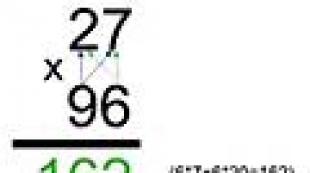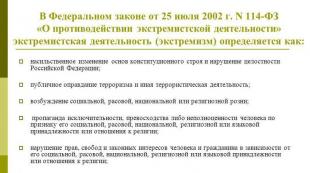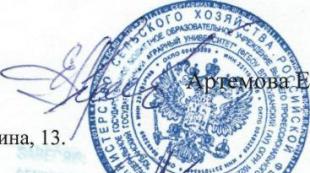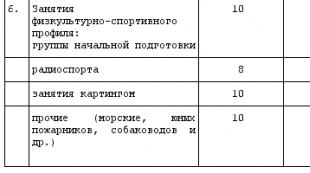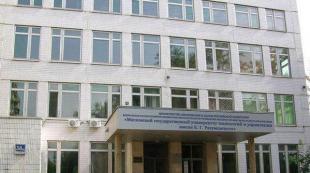Grammatical skill: its structure and stage of formation. Methodological means of learning grammatical design of English speech Grammatical skills and skills
Introduction
Currently, in connection with the approval of the leading position of grammar in the formation of communicative competence, the problem of the formation of grammatical skills is one of the most relevant. The grammatical skill is inhered in its nature and therefore requires an integrated approach affecting all its main parties. Due to the fact that the speech communication is possible in the presence of language competence, part of which consists of grammatical skills, a certain place in the work occupies the characteristic of grammatical skills.
In linguistics, two meanings of this term are distinguished: grammar as one of the main sections of the science of language and grammar as a grammatical system of language.
The grammatical system of the language can be absorbed purely practically without assimilation of the rules about its grammatical phenomena, but the knowledge of these rules facilitates and accelerates practical mastering by a foreign language.
The principle of consciousness underlies all methods used in mastering grammar; Within each method, the ratio of theory with practice is established. The use of pure theory without its confirmation by the specific facts of the functioning of the grammatical phenomenon. As well as pure practices, without comprehending, not taken when grammar in the school course masted.
Grammatical minimum - active, recipe
Objective difficulties of his assimilation of a certain language category of students
Psychological characteristics of skills and specifics of their interaction with lexical and phonetic skills in speech activity
Grammar concepts and phenomena absent in their native language.
Considering that the main sources of difficulties in the assimilation of grammatical material are inter-word and internalized interference, it is necessary to use the techniques of a comparative and comparable analysis of the grammatical phenomena of the IIA in order to identify their similarities and differences in their form, the meaning and features of their use, as well as a comparative analysis of grammatical phenomena and rose ..
- Characteristics of grammatical skill
Grammatical skill is a synthesized action performed in skill parameters and ensuring adequate morphological-syntactic design of a speech unit of any level in speech.
In grammatical skills, the following components can be distinguished:
- the choice of structure adequate to the speech plan of the speaker (in this situation);
- registration of speech units fills in the structure in accordance with the norms of this language and a certain temporary parameter;
- Evaluation of the correctness and adequacy of these actions.
To find out what kind of methodological value it is, we turn to the example.
If we are asked about something and we want to answer with refusal, then this can be expressed in a different way:I would not want to do this. I will not do it. Ask someone elseetc .
The structures in our consciousness are associated with certain communicative tasks: for each task - the functional socket of structures. The fact that the speaker chooses some specific structure depends on the specific conditions: the interlocutor, relations with it, mood, culture, etc.
The choice of structure can be called the functional side of the skill. There is also a formal side - registration. It depends on the point of view of this language and the speed of speech. Registration is closely connected with a word challenge and a combination. Since the design of the structure is based on them, depends on their level, it is necessary to form a grammatical skill on the basis of those lexical units, which the learner owns quite freely.
2. Types of grammatical skills
As you know, grammatical skills differ from each other as different types of speech communication (speaking, reading, listening, writing).
There are two types of skills: expressive and recipe. GG can be defined as stably proper, automated, situationally and contextual use and understanding of grammatical, i.e. Morphological and syntactic linguistic means in all types of speech activities - expressive and recipe.
Under the grammatical spelling skill is meant the correct communicative and motivated automated consumption of grammatical phenomena in oral speech. Grammar skills that ensure proper formation and formation can be called speech morphological skills (for example, the formation of personal endings of verbs). Consequently, the skills responsible for the correct automated position of words in all types of proposals are defined as syntactic speech skills.
Morphological and syntactic voice speech skills are more analytic (discursive) character due to the specifics of the written type of speech.
In this situation, it becomes possible to return to the already written, correct and change the created text.
Receive grammatical skills are automated actions to indicate and decipher the grammatical information in a written or sound text.
Since perception and understanding of oral or written text occurs, both in the active and passive knowledge of the language material, the recipe grammatical skills are divided into recipe-active and recipe-passive reading and listening skills.
There is another kind of skill, which in psychological literature refers to "mental", or "intellectual": language discursively analytical grammatical skills. They are formed on the basis of grammatical knowledge and are used as a background component mainly in writing speech, less often in speaking. Thus, the language skill helps the speaker to control the correctness of speech action, and in case of an erroneous execution, it ensures the correction of inaccuracies.
Determining the role of language skills in the formation of speech, it should be noted that the first create an operating and indicative basis for spending speech grammatical actions; They have a positive effect
on the formation of speech grammatical automatism.
3. Terminological certificate
In the domestic and foreign technique, various terms are used related to the formation of grammatical skills.
USAGE - assimilation of consumption rate. Using the language in artificial situations (in training exercises) in order to repeat TSruks and models. In this case, students demonstrate their knowledge of the language, and not practical skills of its use in real communication situations.
Use - Real Use
Using the language in real conditions, in order to genuine speech communication / interaction
Drill - training
Using training exercises for assimilation and fixing language material by repetition, changes or transform selected and implemented models
Meaningfull Drill - training exercises having semantic significance for students
Such exercises include frequent repetition of models being worked, structures, but not unconscious, but taking into account the semantic significance, with a sufficiently high degree of learning motivation. For example, in gagging games, students will constantly use the same type of questional structures, but it will not be mechanically done, and consciously choosing and partially modifying them at their own discretion to solve the speech task. An important feature of such training is the ability to choose, although limited to a certain framework.
Controlled Exercises - training exercises with a rigid installation specified by the execution mechanism
Exercises of this type usually suggest one correct answer and are directed to the development of language skills, bringing them to automatism. Often, such exercises are associated with mechanical development, performing action on the sample, to substitution with a given choice.
Guided Exercises - Conditional Commonly Training Exercises.
Exercises where, in addition to the installation, tips and explanations are given about how this exercise is performed. In these councils, the emphasis can be made on both purely grammatical rules and composite skills make out statement, etc. In the exercises of this type have some freedom, they can make independent decisions, their creativity is not limited to one rigidly planned response
4. Formation of grammatical skills
The functioning of the grammatical side of speaking is as follows:
a) the speaker chooses a model adequate to his speech plan.
When we need to promise something to the interlocutor, then depend on the situation and relationship with the interlocutor:"I'll do it," "Well, I promise you," "Okay, okay, I will do"And so on. It takes place if the form of the verb of a real time was absorbed together with the" Promise "function and, therefore, marked with it in the consciousness of a person. This is the functional side of the skill, or the selection operation;
b) the speaker draws up the speech units that the model is filled in. The design operation should occur according to the norms of the language and in certain temporary parameters.
The relationship with the situation is inherent not only for the operation of the choice, but also operations of registration, indirectly, through the fact that linguists are called a grammatical value. Say, phrase "In the city build a lotit is possible to express confirmation, and the denial of the thought of the interlocutor (i.e., completely opposite speech functions), but in both cases, the use of the structure of an uncertain-personal offer in it means nomination to the forefront of the aim itself, and not its manufacturer. The choice of the model depends on how much the grammatical meaning is learned (in this case, the uncertainty of the existing person). It is closely related to the design of this model. Consequently, grammatical importance, on the one hand, is associated with the design of the model, on the other, with the situation, from which the choice depends.
Due to the fact that the understanding and recognition of this entail the refusal to the sequential formation first operations of the design (in the linguistic and similar exercises), and then the selection operations (in speech exercise), Registration is forced to break away from situability, and therefore the mechanism of situational tracking the execution of the statement is not produced.
The named mechanism is generated only if the form and function are absorbed in parallel.
Since grammatical skills must be formed, to train, generalize and systematize, this can be done by performing exercises.
Grammar exercises can be reproductive (exercises for the use of language material in speech) and recipe (exercise for perception and recognition of language material).
It should be noted that when learning and forming grammatical language skills, the process of support for the knowledge of grammatical phenomena is very important. native language.
Taking into account the similarities and differences in native and English languages, we allocate the main grammatical topics that are hardly learned by students:
- degrees of comparing the names of adjectives and the shorter;
- consumption of time forms of verbs, species, inclination and coordination of time forms; Education, consumption of complex analytical forms of verb consisting of auxiliary (variable) verb, communion of II meaning verb; and strict order of words in the proposal.
The role of English grammar is not only in the correct construction of phrases and suggestions, but also in mastering the logic of building a sentence, word formation, independence in using the language. In the process of the formation of grammatical skills and their assimilation, thinking, memory, imagination of schoolchildren are developing; With a skillful supply of grammatical phenomena, interest in the language and culture of the people, the carrier of the language being studied.
In this regard, it is necessary to characterize the training and the formation of grammatical skills of the English language as activity. It should be noted that all stages of activities for mastering grammatical skills - and visual perception, recognition in the text, then in speech, and conscious use in communication situations are equally important.
This stage can be called as a chain of action - operations aimed at learning grammatical English skills. This level of activity is operational.
For learning, the grammatical skills of English requires control or self-control over how student has grammatical skills formed, what gaps in knowledge exist how to eliminate errors in the use of grammatical phenomena, what difficulties are experiencing each of them. No further action is impossible without control and analysis. This level is estimated, including control and self-control.
It should be noted that any activity is deeply individual and depends on the peculiarities of perception, memory, imagination involved in the learning process, from the right organization of attention orientation, individual personal and age features. Thus, it is very important not only what way the production of grammatical skills is carried out, but also in which sequence.
5. Planning lesson on the formation of grammatical skill
Before planning a lesson, it is necessary:
1. To carry out a methodological analysis of a new grammatical material in order to allocate features of forms and values \u200b\u200bas objects of assimilation, determine the nature of its connection with the previously passed grammatical material and the possible difficulties of mastering them with students, taking into account internal-speaking and intersective interference.
2. Review those types academic work and exercises that have already been mastered by students at the preceding lessons
3. To familiarize yourself with the existing training funds that are included in the teaching complex, to assess the possibility of their use in working on GM.
II. Taking into account the results of the work carried out, formulate the tasks of the lesson:
1) Acquaint students with a new grammatical phenomenon (the phenomenon specifically specifically).
2) Training students in the use of a new grammatical phenomenon
3) teach students to use new grammar material in conversation and monologue statement
4) Teach students to understand on rumor or read text containing a new grammar material.
III. Create a program aimed at solving the task:
1) give an installation for listening to a speech sample containing a new grammatical phenomenon in order to understand it
2) present a speech sample in a speech situation and reveal the value of a new grammatical phenomenon with the help of appropriate reception
3) Check understanding the students' meanings of a new grammatical phenomenon
4) give the installation to the secondary listening of the speech sample, in order to play it with a support for a sample speech of the teacher.
5) Put a speech sample re-highlighting a new grammatical phenomenon. And relate it to the situation.
6) organize the performance of speech exercises in order to apply a new grammatical phenomenon in the rei students and understanding when reading and on rumor
7) systematize students' knowledge of the studied grammatical material and monitor his assimilation.
6. System training: pros and cons
Arguments in defense of the systemic study of grammar in the course of a foreign language
Arguments against the enhanced studies of grammar in the course of a foreign language
1. Starting with the younger teenage age (9-10 years old), people begins to prevail categorical thinking. The study of grammar in the system, through the development of grammatical categories, allows you to establish system connections in the language and make speech grammatically correct and clean without supernatural effort
2. The study of grammar is very interesting and exciting. introduces people to the world of new concepts
3. The study of grammar in the system allows you to better understand the cultural features of people speaking in this language, their mentality
1. Having mastered the native language, a person does not study the rules of grammar, but assimilates the patterns of building speech in the process of communication
2. Many native speakers allow a large number of grammatical errors and reservations, but this is not considered to be unacceptable. Too right speech Lack of grammatical errors issues an educated foreigner
3. The explanation of grammar in grammatical reference books is built using such a number of specific grammatical terms, which is almost impossible to understand anyone first time. Such an explanation is rather confused by an unprepared reader than ensuring the necessary assistance.
4. Estimating the grammar of a foreign language helps it is better to understand the features of the system of the native language
5. The study of grammar contributes to the development of logic and memory, disciplines thinking
6.Goodly formed grammatical skills facilitate the process of interaction in oral and written speech
4. The effectiveness of speech interaction is determined not only by compliance with the rules of grammar, but also by other language and speech skills and skills.
5. We must try to avoid mistakes that drastically impede effective speech interaction, but it is not necessary to have a complete picture of the entire grammatical system of the language.
6. Training of grammar by mechanical recording rules and their development in the system of wildcard exercises on abstract, meaningless examples, in the separation from real communicative situations, does not give little to form real grammatical literacy
7. Despite the fact that there are many grammatical phenomena in any language, they can be combined within the framework of quite discrete categories. Unlike vocabulary, the grammar material will be prompted. Another Academician L. V. Shcherba said: "Lexik - a fool, grammar - well done."
7. Even in the international examiner system, the requirements for the formation of grammatical skills do not occupy a large place, since in the domestic practice of learning, the grammar is a measure of literacy and the success of mastering
Conclusion
The study of grammar inevitably when mastering a foreign language and is one of the most important components of learning a foreign language at school.
The relevance of this course is that it is necessary for the formation of the mechanism of perception and generate statements that students capture the structural-grammatical design of speech, i.e. The grammatical system of a foreign language. But in the conditions of studying a foreign language, when there is no direct communication with native speakers, and even more so in the presence of several lessons a week, grammar have to study, addressing the rules, to learn grammatical structures and grammatical language.
Therefore, special attention in this course is assigned to the formation of students in the skill of the analogies, opposition, generalizations, comparisons between different facts and phenomena of English grammar.
Bibliography
- Gez N. I., Lyakhovitsky M. V. Methodology of training foreign languages in middle school. - M., 2008.
- Golitsinsky Yu.B. "Grammar. Collection of exercise ", St. Petersburg," Caro ", 2002.
- Passs E.I. Fundamentals of communicative learning techniques in foreign language communication. M., 2009.
- Pasis E. I. Fundamentals of methods of teaching foreign languages. - M.: Russian, 2007. - 216 p.
- Passs E. I. Solidal speech exercises for the formation of grammatical skills. - M.: Enlightenment, 2008. - 128 p.
- Rubinstein S. L. Basics general psychology. - SP.: Peter Com, 2009. - 120 s.
1.2. Characteristics of grammatical skills in various types of speech activities.
Grammar skills are components of different types of speech activities and differ from each other as different types of speech communication themselves. Therefore, we first define the main types of grammatical skills in speaking and writing.
Under the grammatical spelling skill is understood as stably properly and automated, communicatively motivated use of grammatical phenomena in oral speech. Such possessions of grammatical means of the language is based on speech dynamic shape stereotypes in unity with their meaning, "sound and meanings". The main qualities of the grammatical spelling skill, therefore, are the automation and integrity in the performance of grammatical operations, the unity of the form and values, the situational and communicative condition of its functioning.
Grammar skills providing proper and automated formation and word forms in oral speech in this language can be called speech morphological skills. IN english language These include the skills of the proper use of personal endings and forms of verbs.
Speech grammatical skills that provide a stable and automated arrangement of words (word order) in all types of proposals in English in oral speech, in accordance with the language directions, you can define as syntactic speech skills, i.e., the main syntactic schemes (stereotypes) Proposals.
Morphological and syntactic voice speech skills in perfect language proficiency have the same mechanisms as orally speech skills with those, however, by the addition, which is due to a written form of speech, i.e. graphic and spelling skills.
These skills differ from oral speech skills primarily by the fact that they are more discursive analytical nature due to the specifics of the written type of speech. The process of fixing on the letter of speech work, unlike the process of generating speech orally, allows you to return to the written, to stop on it, analyze, correct, clarify using spelling grammatical rules, since temporal characteristics of the written speech are not as strictly determined as oral themes speech.
Under receptive grammatical skills, automated actions to recognize and understand the grammatical information (morphological forms and syntactic structures) in writing and oral text are implied. Since the reception of oral and written text can occur both with the active and passive knowledge of language material, recipe grammatical skills should be classified into recipe-active and recipe-passive grammatical skills of reading and listening. From the above, it follows that the term "recipe skills" cannot be identified only with the term "passive skills", they can also be recipe-active (when reading and listening to text, the material of which students own the students actively).
The recipe-active grammatical skills of the audience are based on speech automated links of incisive-recycling images of grammatical phenomena and their values. The recipe-active grammatical reading skills are based on the links of visual-graphic and relapse images of these phenomena with their values. These links are manifested in the automated process of perception and extensiveness (immediance) of the understanding of the read (audited) text and the grammatical information contained in it, due to the level of development of individual-speech experience in these recipe types of speech activities, i.e., experience in reading and listening.
The degree of perfection of individual-speech experience is expressed in the presence of solid and developed hearing-auctor and visual images with their meaning in long-term speech memory of a person.
Along with active-recipe speech grammatical skills, students should also be formulated for passive-recipe skills (within the framework of passively digestible grammatical material). Such skills include:
1) the skills of recognition and understanding of grammatical phenomena in the text based on the visual memory of the images created in the process of formation and development of reader experience;
2) Discursive-operational language grammatical analysis skills (analytical decoding) of grammatical information of the text.
The first type of grammatical skills is formed in the process of abundant easy reading, the second - as a result of reading difficult in grammatically texts or places of text and the use of elements for analyzing grammatical phenomena.
The characteristic of grammatical skills would be incomplete, if not referring to language grammatical skills, under which the discursive-analytic operating skills are understood by the grammatical material (word-dependent skills and lining), formed and performed on the basis of grammatical knowledge in the process of performing language exercises.
Like the same-name speech grammatical skills, they can be recipe (when identifying grammatical phenomena in writing and oral text), they can also be productive and used mainly in writing speech, less often in speaking, as a background component.
For language grammatical skills, the discursiveness, noncommunication, the incompatibility of its functioning is characteristic. This skill can be attributed to skills, which in psychological literature were called "mental", "intellectual".
In the Soviet methodological literature for a long time, language skills were identified with speech. For the first time, the term "speech skill" was introduced into the wide use of B. V. Belyaev, who did not use the term "Language Skill". Some methodologists deny the utility of these skills, even the legitimacy of the name of their skills.
The need to form a language skill in conditions high School It is explained by a number of reasons, among which the following should be called. Firstly, language skills can act as a "spare" in the event of a failure of a speech grammatical skill (when forgottening, during deutomatization, during failures in speech expressed in grammatical errors) or its insufficient automation. For example, a student makes it difficult to use this (necessary) personal ending of the verb and "reconstructs" it using a language action based on the rules. Secondly, the language skill is part of the mechanism that controls the correctness of the speech action by the speaking themselves, and during the erroneous execution it ensures the error correction. Thirdly, parallel forms of linguistic and speech grammatical skills provide a conscious indicative basis for creating speech skills.
Grammar skills are components of different types of speech activities and differ from each other as different types of speech communication themselves are different.
The grammatical spelling skills provide proper and automated, communicatively - motivated use of grammatical phenomena in oral speech.
Speech morphological skills provide proper and automated forms and word forms in oral speech.
Syntax speech skills provide the correct and automated arrangement of words in all types of proposals.
Receive-active grammatical skills provide an automated correlation of the audio-recorder (when auditing) and visual-graphic (when reading) images with their values.
Passive-recipe skills ensure recognition and understanding of grammatical phenomena in the text and the ability to analytical decoding of grammatical information of the text.
Under language grammatical skills are understood by the discursive and analytical skills of operating with grammatical material. The formation of this type of skills is necessary when teaching a foreign language, since the language skill provides a conscious indicative basis in the formation of speech grammatical skills.
Language units are more economical. Some units cannot be properly described, without using the apparatus of grammar designs. Chapter 2. Comparative analysis of predictions in the structures of forced movement in Russian and English 2.1. The role of the pretext in English-speaking structures Preposition is a service word expressing the relationship of noun or pronouncing to other words in ...
Modern language In their relationship, it can be understood only in historical lighting, which is not only in the nearest past, but deepening and in the most distant epochs of the language of the language; The historical explanation of most of the phenomena of the modern Russian language, "says A. A. Chematov, - can not be limited to the data provided by written monuments from the XI century, it should ...
Grammar skills are components of different types of speech activities and differ from each other as different types of speech communication themselves. Therefore, we first define the main types of grammatical skills in speaking and writing.
Under the grammatical spelling skill is understood as stably properly and automated, communicatively motivated use of grammatical phenomena in oral speech. Such a possession of grammatical means of language is based on speech dynamic stereotypes of the form in unity with their meaning, "sound and meanings". The main qualities of the grammatical spelling skill, therefore, are the automation and integrity in the performance of grammatical operations, the unity of the form and values, the situational and communicative condition of its functioning.
Grammar skills providing proper and automated formation and word forms in oral speech in this language can be called speech morphological skills. In English, it includes the skills of the right use of personal endings and forms of verbs.
Speech grammatical skills that ensure a stably correct and automated arrangement of words in all types of proposals in English in oral speech, in accordance with the language directions, it is possible to determine as syntactic speech skills, i.e. the skills of the main syntactic schemes (stereotypes) of proposals.
Morphological and syntactic voice speech skills in perfect language proficiency have the same mechanisms as orally speech skills with those, however, by the addition, which is due to a written form of speech, i.e. graphic and spelling skills.
These skills differ from oral speech skills primarily by the fact that they are more discursive analytical nature due to the specifics of the written type of speech. The process of fixing on a letter of speech work, unlike the process of generating speech orally, allows you to return to what is written, to stop on it, analyze, correct, clarify using spelling grammatical rules. Let us dwell on the characteristics of grammatical skills in the receptive types of speech activities.
Under receptive grammatical skills, automated actions to recognize and understand the grammatical information (morphological forms and syntactic structures) in writing and oral text are implied. Since the reception of oral and written text may occur, both with the active and passive knowledge of language material, recipe grammatical skills should be classified into recipe-active and recipe-passive grammatical reading and listening skills. From the above, it follows that the term "recipe skills" cannot be identified only with the term "passive skills", they can also be recipe-active (when reading and listening to text, the material of which students own the students actively).
The recipe-active grammatical skills of the audience are based on speech automated links of incisive-recycling images of grammatical phenomena and their values. The recipe-active grammatical reading skills are based on the links of visual-graphic and relapse images of these phenomena with their values. These links are manifested in the automated process of perception and extensiveness (immediance) of the understanding of the read (audited) text and the grammatical information contained in it, due to the level of development of individual-speech experience in these recipe types of speech activities, i.e., experience in reading and listening.
The degree of perfection of individual-speech experience is expressed in the presence of solid and developed hearing-auctor and visual images with their meaning in long-term speech memory of a person.
Along with active-recipe speech grammatical skills, students should also be formulated for passive-recipe skills (within the framework of passively digestible grammatical material). Such skills include:
skills of recognition and understanding of grammatical phenomena in the text based on the images created in the formation and development of reader experience;
2) Discursive Operating Language Grammar Skills for Analysis of Grammar Text Information.
The first type of grammatical skills is formed in the process of abundant easy reading, the second - as a result of reading difficult in grammatically texts or places of text and the use of elements for analyzing grammatical phenomena.
The characteristic of grammatical skills would be incomplete, if not referring to language grammatical skills, under which the discursive-analytic operating skills are understood by the grammatical material (word-dependent skills and lining), formed and performed on the basis of grammatical knowledge in the process of performing language exercises.
Like the same-name speech grammatical skills, they can be recipe (when identifying grammatical phenomena in writing and oral text), they can also be productive and used mainly in writing speech, less often in speaking, as a background component.
For language grammatical skills, the discursiveness, noncommunication, the incompatibility of its functioning is characteristic. This skill can be attributed to skills, which in psychological literature were called "mental", "intellectual".
The need to form a linguistic skill in secondary school conditions is due to a number of reasons, among which the following should be called. Firstly, language skills can act as a "spare" in the event of a failure of a speech grammatical skill (when forgottening, during deutomatization, during failures in speech expressed in grammatical errors) or its insufficient automation. For example, a student makes it difficult to use this (necessary) personal ending of the verb and "reconstructs" it using a language action based on the rules. Secondly, the language skill is part of the mechanism that controls the correctness of the speech action by the speaking themselves, and during the erroneous execution it ensures the error correction. Thirdly, parallel forms of linguistic and speech grammatical skills provide a conscious indicative basis for creating speech skills.
Koprew Larisa Gennadievna
Kopreva Larisa Gennadievna.
candidate of Philology,
associate Professor of the Department of Foreign Languages
Military Training and Scientific Center of the Air Force
Military Academy
them. prof. NOT. Zhukovsky and Yu.A. Gagarin
(branch in Krasnodar)
The problem of forming grammatical English skills
Phd in Philology, Associate Professor of the Chair of Foreign Languages, Military Training Research Center Of Air Force Academy (Krasnodar Affiliate) [Email Protected]
PROBLEM OF FORMING OF GRAMMAR SKILLS OF THE ENGLISH LANGUAGE
Annotation:
This article discusses the problem of learning and forming grammatical skills of the English language, its components, types of skills, formation of grammatical skills, the role of language skills is determined.
Keywords:
grammar skills, choice of structure, functional side skill, grammatical spelling skills, morphological and syntactic speech skills.
This Article Deals With The Problem of Teaching And Forming Of Grammar Skills of the English Language, of the Which It Consists, The Types of the Skills, The Forming Grammar Skills, Determining The Role of Language Skills.
grammar Skills, Choice of Structure, Functional Side Of Skill, Grammar Skill of Speaking, Morphological and Syntactic Spech Skills.
Currently, in connection with the approval of the leading position of grammar in the formation of communicative competence, the problem of the formation of grammatical skills is one of the most relevant. The grammatical skill is inhered in its nature and therefore requires an integrated approach affecting all its main parties. Due to the fact that the speech communication is possible in the presence of language competence, part of which consists of grammatical skills, a certain place in the work occupies the characteristic of grammatical skills.
Characteristics of grammatical skill.
Grammatical skill is a synthesized action performed in skill parameters and ensuring adequate morphological-syntactic design of a speech unit of any level in speech.
In grammatical skills, the following components can be distinguished:
The choice of structure adequate to the speech plan of the speaker (in this situation);
Registration of speech units fills in the structure in accordance with the norms of this language and a certain temporary parameter;
Evaluation of the correctness and adequacy of these actions.
To find out what kind of methodological value it is, we turn to the example. If we are asked about something and we want to answer with refusal, then this can be expressed in a different way: I would not like to do that. I will not do it. Ask someone else, etc.
The structures in our consciousness are associated with certain communicative tasks: for each task - the functional socket of structures. The fact that the speaker chooses some specific structure depends on the specific conditions: the interlocutor, relations with it, mood, culture, etc.
The choice of structure can be called the functional side of the skill. There is also a formal side - registration. It depends on the point of view of this language and the speed of speech. Registration is closely connected with a word challenge and a combination. Since the design of the structure is based on them, depends on their level, it is necessary to form a grammatical skill on the basis of those lexical units, which the learner owns quite freely.
Types of grammatical skills.
As you know, grammatical skills differ from each other as different types of speech communication (speaking, reading, listening, writing).
Under the grammatical spelling skill is meant the correct communicative and motivated automated consumption of grammatical phenomena in oral speech. Grammar skills that ensure proper formation and formation can be called speech morphological skills (for example, the formation of personal endings of verbs). Consequently, the skills responsible for the correct automated position of words in all types of proposals are defined as syntactic speech skills.
Morphological and syntactic voice speech skills are more analytic (discursive) character due to the specifics of the written type of speech. In this situation, it becomes possible to return to the already written, correct and change the created text.
Receive grammatical skills are automated actions to indicate and decipher the grammatical information in a written or sound text.
Since perception and understanding of oral or written text occurs, both in the active and passive knowledge of the language material, the recipe grammatical skills are divided into recipe-active and recipe-passive reading and listening skills.
There is another kind of skill, which in psychological literature refers to "mental", or "intellectual": language discursively analytical grammatical skills. They are formed on the basis of grammatical knowledge and are used as a background component mainly in writing speech, less often in speaking. Thus, the language skill helps the speaker to control the correctness of speech action, and in case of an erroneous execution, it ensures the correction of inaccuracies.
Determining the role of language skills in the formation of speech, it should be noted that the first create an operating and indicative basis for spending speech grammatical actions; They have a positive effect
on the formation of speech grammatical automatism.
Formation of grammatical skills.
The functioning of the grammatical side of speaking is as follows:
a) the speaker chooses a model adequate to his speech plan.
When we need to promise something to the interlocutor, we, depending on the situation and relationship with the interlocutor, say: "I will do it," "Well, I promise you," okay, okay, I will do it, "and so on. It happens in The case if the form of the verb of a real time was absorbed together with the "promise" function and, therefore, was marked with it in the consciousness of a person. This is the functional side of the skill, or the selection operation;
b) the speaker draws up the speech units that the model is filled in. The design operation should occur according to the norms of the language and in certain temporary parameters.
The relationship with the situation is inherent not only for the operation of the choice, but also operations of registration, indirectly, through the fact that linguists are called a grammatical value. Let's say, the phrase "in the city build a lot" you can express confirmation, and the denial of the thought of the interlocutor (i.e., absolutely opposite speech functions), but in both cases, the use of the structure of an uncertain-personal offer in it means nomination of the aim itself, and Not his manufacturer. The choice of the model depends on how much the grammatical meaning is learned (in this case, the uncertainty of the existing person). It is closely related to the design of this model. Consequently, grammatical importance, on the one hand, is associated with the design of the model, on the other, with the situation, from which the choice depends.
Due to the fact that the understanding and recognition of this entail the refusal to the sequential formation first operations of the design (in the language and their similar exercises), and then the selection operations (in speech
exercises), the design is forced to disappear from situitation, and therefore the mechanism of situational tracking over the execution of the statement is not developed. The named mechanism is generated only if the form and function are absorbed in parallel.
Since grammatical skills must be formed, to train, generalize and systematize, this can be done by performing exercises. Grammar exercises can be reproductive (exercises for the use of language material in speech) and recipe (exercise for perception and recognition of language material).
It should be noted that when learning and forming grammatical language skills, the process of support on the knowledge of the grammatical phenomena of the native language is very important. Taking into account the similarities and differences in native and English languages, we allocate the main grammatical topics that are hardly learned by cadets:
The degree of comparing the names of adjectives and the shorter;
Use of temporal forms of verbs, species, inclination and coordination of time forms; Education, consumption of complex analytical forms of verb consisting of auxiliary (variable) verb, communion of II meaning verb; and strict order of words in the proposal.
The role of English grammar is not only in the correct construction of phrases and suggestions, but also in mastering the logic of building a sentence, word formation, independence in using the language. In the process of forming grammatical skills and their assimilation, thinking, memory, the imagination of cadets is developing; With a skillful supply of grammatical phenomena, interest in the language and culture of the people, the carrier of the language being studied.
In this regard, it is necessary to characterize the training and the formation of grammatical skills of the English language as activity. It should be noted that all stages of activities for mastering grammatical skills - and visual perception, recognition in the text, then in speech, and conscious use in communication situations are equally important.
This stage can be called as a chain of action - operations aimed at learning grammatical English skills. This level of activity is operative.
To train the grammatical skills of the English language, control or self-control of how the cadets have formed grammatical skills, which gaps in knowledge exist, how to eliminate errors in the use of grammatical phenomena, what difficulties is experiencing every cadet. Without control and analysis
further actions are impossible. This level is estimated, including control and self-control.
It should be noted that any activity is deeply individual and depends on the peculiarities of perception, memory, imagination involved in the learning process, from the right organization of attention orientation, individual personal and age features. Thus, it is very important not only what way the production of grammatical skills is carried out, but also in which sequence.
1. Pasis E.I. Basics of communicative methods - 1. Passov E.I. Osnovy Kommunikativnoy Metodiki training of learning in foreign language communication. M., 1989. Obucheniya Inoyazychnomu Obshcheniyu. M.
In the methodical literature, there is an attempt to solve the problem of learning for the formal and meaningful parties of speech by means of a phased sequence of mastering the material A complex organization: on the first - structural-thematic - stage, students are seduced by new grammatical material (structures and morphological forms) on the previously studied, thematically related vocabulary. At the second - theatic structural stage, the main attention is paid to the new vocabulary on the topic based on previously learned structures. It is quite possible to introduce a certain number of new grammatical material. In the third - interconnection stage, conditions are created for creative and proper recoming previously learned and studied lexical and grammatical material in oral and written speech but interconnecting situations.
Three extreme trends in solving the problem of the relationship between the grammatical and lexical aspects in the complex in the organization of the material are methodologically
1) the underestimation of the importance of the integrated organization of the language material (vocabulary and grammar are studied separately from each other);
2) ignoring the characteristics of the grammatical and lexical aspects of the language in the comprehensive study;
3) orientation for any one (grammatical or lexical) aspect of the language in the formal compliance with the complex.
The one-sided solution of this problem makes it difficult to teach students to foreign languages \u200b\u200bas a full-fledged communication tool.
As already noted, the organization of grammatical material is important for the formation of grammatical skills in the skill of speaking, listening, reading and writing.
Thus, on the structural and theatic structural stages, favorable conditions are created for the formation of syntactic skills both at the level of individual structures and at the level of a connected, elementary dialogic and monologue speech due to the fact that it allows you to purposefully train the structures of proposals not only separately, but also In the thematic connection with each other. The interconnect stage has a positive effect on the formation and improvement of speech (monological and dialogic) skills, as well as the skill of reading and uninterrupted understanding of connected texts.
§ The main requirements for the volume of grammatical material to be assimilated in high school are: its sufficiency to use the language as a means of communication in the limits specified and reality to assimilate it in these conditions.
§ The need to limit the grammatical material is due to the impossibility of mastering the entire grammatical system in secondary school, due to the cost of a significant amount of time to perform exercises for the formation of grammatical skills. The overestimation of the volume of grammatical material has a negative effect on the quality of students' possession.
§ The basic principles of the selection into an active grammatical minimum are: 1) the principle of prevalence in oral speech, 2) the principle of exemployment, 3) the principle of exclusion of synonymous phenomena. In accordance with these principles, only those phenomena are included in the active minimum that are absolutely necessary for productive types of speech activities.
§ The basic principles of selection into passive grammatical minimum are: 1) the principle of prevalence in the book-writing speech style, 2) the principle of meaningfulness. In accordance with these principles, the most common phenomena of the book-written style of speech, having a number of values, are included in the passive minimum.
§ The principle of functionality of the organization of grammatical material is extremely important. Grammatical phenomena should not be studied in the separation from the lexical material.
1.2. Characteristics of grammatical skills in various types of speech activities.
Grammar skills are components of different types of speech activities and differ from each other as different types of speech communication themselves. Therefore, we first define the main types of grammatical skills in speaking and writing.
Under the grammatical spelling skill is understood as stably properly and automated, communicatively motivated use of grammatical phenomena in oral speech. Such possessions of grammatical means of the language is based on speech dynamic shape stereotypes in unity with their meaning, "sound and meanings". The main qualities of the grammatical spelling skill, therefore, are the automation and integrity in the performance of grammatical operations, the unity of the form and values, the situational and communicative condition of its functioning.
Grammar skills providing proper and automated formation and word forms in oral speech in this language can be called speech morphological skills. In English, it includes the skills of the right use of personal endings and forms of verbs.
Speech grammatical skills that provide a stable and automated arrangement of words (word order) in all types of proposals in English in oral speech, in accordance with the language directions, you can define as syntactic speech skills, i.e., the main syntactic schemes (stereotypes) Proposals.
Morphological and syntactic voice speech skills in perfect language proficiency have the same mechanisms as orally speech skills with those, however, by the addition, which is due to a written form of speech, i.e. graphic and spelling skills.
These skills differ from oral speech skills primarily by the fact that they are more discursive analytical nature due to the specifics of the written type of speech. The process of fixing on the letter of speech work, unlike the process of generating speech orally, allows you to return to the written, to stop on it, analyze, correct, clarify using spelling grammatical rules, since temporal characteristics of the written speech are not as strictly determined as oral themes speech.
Under receptive grammatical skills, automated actions to recognize and understand the grammatical information (morphological forms and syntactic structures) in writing and oral text are implied. Since the reception of oral and written text can occur both with the active and passive knowledge of language material, recipe grammatical skills should be classified into recipe-active and recipe-passive grammatical skills of reading and listening. From the above, it follows that the term "recipe skills" cannot be identified only with the term "passive skills", they can also be recipe-active (when reading and listening to text, the material of which students own the students actively).
The recipe-active grammatical skills of the audience are based on speech automated links of incisive-recycling images of grammatical phenomena and their values. The recipe-active grammatical reading skills are based on the links of visual-graphic and relapse images of these phenomena with their values. These links are manifested in the automated process of perception and extensiveness (immediance) of the understanding of the read (audited) text and the grammatical information contained in it, due to the level of development of individual-speech experience in these recipe types of speech activities, i.e., experience in reading and listening.


